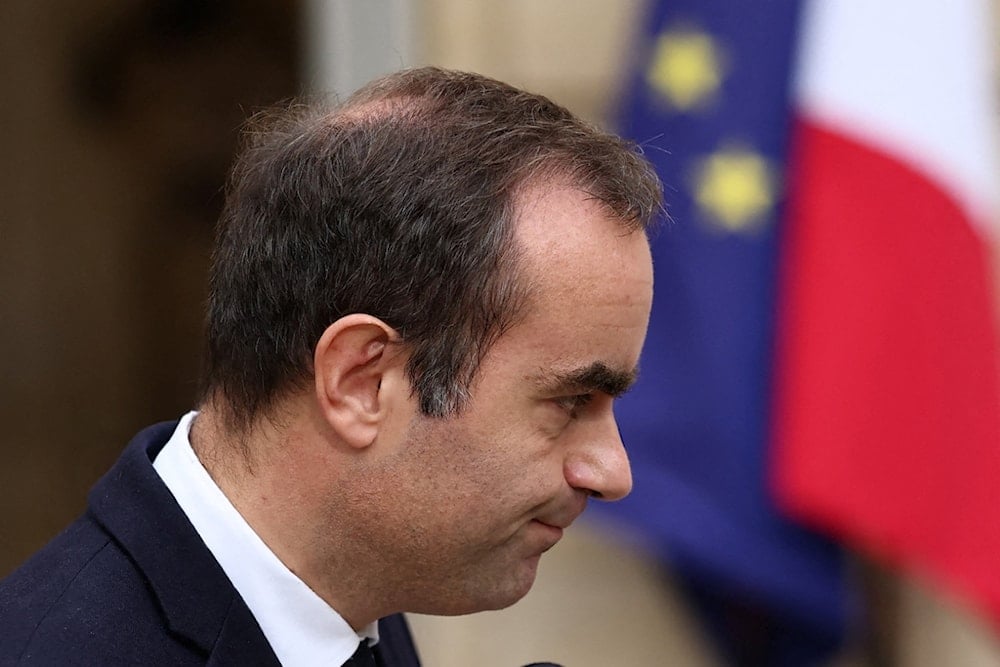French PM Lecornu again tries to end political deadlock
Sebastien Lecornu begins last-ditch talks to save his cabinet as France faces a deep political crisis amid talks that French President Emmanuel Macron may call for new elections if efforts fail.
-

French outgoing Prime Minister Sebastien Lecornu, who resigned just a day after naming his government, reacts after delivering his statement at the Hotel Matignon in Paris, Monday, October 6, 2025. (Stephane Mahe/Pool via AP)
France’s outgoing Prime Minister Sebastien Lecornu began final efforts on Tuesday to rally cross-party support for a cabinet capable of ending the country’s ongoing political crisis.
French President Emmanuel Macron, who appointed Lecornu in early September following the collapse of the previous government, instructed him to form a coalition that could stabilize governance and pass key legislation.
Lecornu, 39, unveiled a cabinet lineup on Sunday, but its resemblance to the previous government drew immediate criticism. He resigned the following morning, only to accept Macron’s request later in the day to make one last attempt at salvaging his administration.
According to a presidential source, Macron tasked Lecornu with “conducting final negotiations by Wednesday evening to define a platform of action and stability for the country.”
Read more: France faces mass strikes over Macron’s cost-cutting budget
Political crisis deepens in France
The ongoing turmoil is the latest chapter in French politics, where tensions have run high since Macron’s snap elections in mid-2024 resulted in a hung parliament. The president’s centrist bloc no longer commands a majority, leaving France mired in legislative paralysis.
If Lecornu’s talks fail, Macron may call for new parliamentary elections or even consider appointing a new prime minister, who would be the eighth under his presidency.
Former Prime Minister Gabriel Attal, who now leads Macron’s party, expressed growing frustration, saying it was “time to try something else.”
Opposition parties call for elections
Across the political spectrum, leaders are seizing the moment to demand change. Former Premier Edouard Philippe criticized what he called a “distressing political game” and urged Macron to call early presidential elections once the 2026 budget is passed.
On the left, Socialist Party head Olivier Faure called for “a change of course” and the formation of a left-leaning government. Bruno Retailleau, the leader of the right-wing Republicans and outgoing interior minister, indicated conditional willingness to remain in government if his party retains influence.
Far-right figure Marine Le Pen described the situation as “untenable” and called on Macron to resign or trigger snap legislative elections, which she deemed “absolutely necessary.” Her party colleague, Jordan Bardella, said the National Rally (RN) was “ready to govern,” reflecting the far right’s growing confidence ahead of the 2027 presidential race.
Political analysts say Le Pen senses her strongest opportunity yet to take power, as France faces voter fatigue with Macron’s centrist leadership and widespread frustration over austerity measures.
France’s economic woes and political uncertainty
The crisis unfolds amid economic strain. France’s public debt has soared to record levels, now the third-highest debt-to-GDP ratio in the European Union, behind only Greece and Italy. The figure is close to double the 60 percent ceiling permitted under EU rules.
Despite mounting pressure, Macron has ruled out resigning before his mandate ends in 2027. However, without a clear majority or a unifying government, France’s political crisis risks deepening, potentially forcing Macron to either seek new elections or a broad national compromise.
Read more: French markets plunge as PM quits after just 12 hours in office

 3 Min Read
3 Min Read








